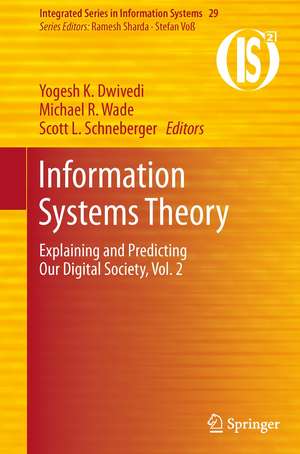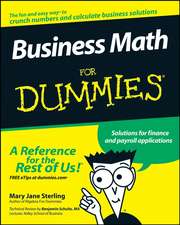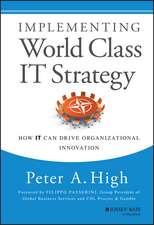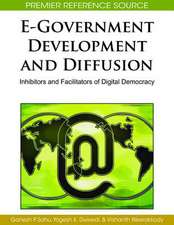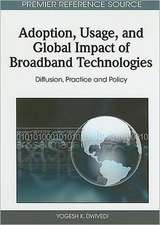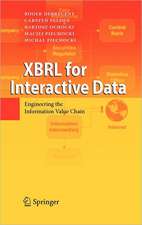Information Systems Theory: Explaining and Predicting Our Digital Society, Vol. 2: Integrated Series in Information Systems, cartea 29
Editat de Yogesh K. Dwivedi, Michael R. Wade, Scott L. Schnebergeren Limba Engleză Paperback – 24 oct 2013
- To describe the various theories and models applicable to studying IS/IT management issues.
- To outline and describe, for each of the various theories and models, independent and dependent constructs, reference discipline/originating area, originating author(s), seminal articles, level of analysis (i.e. firm, individual, industry) and links with other theories.
- To provide a critical review/meta-analysis of IS/IT management articles that have used a particular theory/model.
- To discuss how a theory can be used to better understand how information systems can be effectively deployed in today’s digital world.
The first section of Volume 1 presents detailed descriptions of a set of theories centered around the IS lifecycle, including the Success Model, Technology Acceptance Model, User Resistance Theories, and four others. The second section of Volume 1 contains strategic and economic theories, including a Resource-Based View, Theory of Slack Resources, PortfolioTheory, Discrepancy Theory Models, and eleven others.
The first section of Volume 2 concerns socio-psychological theories. These include Personal Construct Theory, Psychological Ownership, Transactive Memory, Language-Action Approach, and nine others. The second section of Volume 2 deals with methodological theories, including Critical Realism, Grounded Theory, Narrative Inquiry, Work System Method, and four others.
Together, these theories provide a rich tapestry of knowledge around the use of theory in IS research. Since most of these theories are from contributing disciplines, they provide a window into the world of external thought leadership.
| Toate formatele și edițiile | Preț | Express |
|---|---|---|
| Paperback (2) | 952.72 lei 6-8 săpt. | |
| Springer – 24 oct 2013 | 952.72 lei 6-8 săpt. | |
| Springer – 27 oct 2013 | 1155.80 lei 38-44 zile | |
| Hardback (2) | 959.04 lei 6-8 săpt. | |
| Springer – 20 sep 2011 | 959.04 lei 6-8 săpt. | |
| Springer – 20 sep 2011 | 1337.51 lei 6-8 săpt. |
Din seria Integrated Series in Information Systems
- 15%
 Preț: 646.62 lei
Preț: 646.62 lei - 20%
 Preț: 996.07 lei
Preț: 996.07 lei - 20%
 Preț: 1272.94 lei
Preț: 1272.94 lei -
 Preț: 389.11 lei
Preț: 389.11 lei - 20%
 Preț: 998.04 lei
Preț: 998.04 lei - 15%
 Preț: 654.43 lei
Preț: 654.43 lei - 20%
 Preț: 1933.71 lei
Preț: 1933.71 lei -
 Preț: 388.52 lei
Preț: 388.52 lei - 15%
 Preț: 646.11 lei
Preț: 646.11 lei - 15%
 Preț: 667.71 lei
Preț: 667.71 lei - 15%
 Preț: 711.89 lei
Preț: 711.89 lei -
 Preț: 393.52 lei
Preț: 393.52 lei - 15%
 Preț: 644.82 lei
Preț: 644.82 lei - 18%
 Preț: 955.25 lei
Preț: 955.25 lei - 5%
 Preț: 1280.25 lei
Preț: 1280.25 lei - 15%
 Preț: 580.97 lei
Preț: 580.97 lei - 15%
 Preț: 638.11 lei
Preț: 638.11 lei - 20%
 Preț: 1277.24 lei
Preț: 1277.24 lei - 20%
 Preț: 1215.14 lei
Preț: 1215.14 lei - 20%
 Preț: 638.37 lei
Preț: 638.37 lei - 5%
 Preț: 1801.57 lei
Preț: 1801.57 lei - 15%
 Preț: 653.14 lei
Preț: 653.14 lei - 20%
 Preț: 995.75 lei
Preț: 995.75 lei - 20%
 Preț: 649.28 lei
Preț: 649.28 lei
Preț: 952.72 lei
Preț vechi: 1161.85 lei
-18% Nou
Puncte Express: 1429
Preț estimativ în valută:
182.33€ • 189.65$ • 150.52£
182.33€ • 189.65$ • 150.52£
Carte tipărită la comandă
Livrare economică 14-28 aprilie
Preluare comenzi: 021 569.72.76
Specificații
ISBN-13: 9781461429708
ISBN-10: 1461429706
Pagini: 472
Ilustrații: XXVI, 446 p.
Dimensiuni: 155 x 235 x 25 mm
Greutate: 0.65 kg
Ediția:2012
Editura: Springer
Colecția Springer
Seria Integrated Series in Information Systems
Locul publicării:New York, NY, United States
ISBN-10: 1461429706
Pagini: 472
Ilustrații: XXVI, 446 p.
Dimensiuni: 155 x 235 x 25 mm
Greutate: 0.65 kg
Ediția:2012
Editura: Springer
Colecția Springer
Seria Integrated Series in Information Systems
Locul publicării:New York, NY, United States
Public țintă
Professional/practitionerCuprins
Employing Personal Construct Theory to Understand Information Systems: A Practical Guide for Researchers.- Psychological Ownership and the Individual Appropriation of Technology.- Transactive Memory and its Application in IS Research.- The Language-Action Approach: Information Systems Supporting Social Actions.- A Review of the Organizational Information Processing Theory.- Scientia Potentia Est: Organizational Learning, Absorptive Capacity and the Power of Knowledge.- Applying Actor Network Theory and Managing Controversy.- Using Concepts from Structuration Theory and Consequence of modernity to Understand IS Deployment in Healthcare Setting.- Hubble Bubble Toil and Trouble: The Special Case of Emergency Services.- ERP Diffusion and Assimilation Using IT-Innovation Framework.- The Yield Shift Theory of Satisfaction and its Application to the IS/IT Domain.- Intention-based Models: The Theory of Planned Behavior within the Context of IS.- Understanding IS Theory: An Interpretation of Key IS Theoretical Frameworks using Social Cognitive Theory.- The Potential of Critical Realism in IS Research.- Grounded Theory and Information Systems: Are We Missing the Point?.- Developing Theories in Information Systems Research: The Grounded Theory Method Applied.- The Mikropolis Model: A Framework for Transdisciplinary Research of Information Systems in Society.- Inquiring Systems: Theoretical Foundations for Current and Future Information Systems.- Information Systems Deployment as an Activity System.- The Work System Method as an Approach for Teaching and Researching Information Systems.-
Textul de pe ultima copertă
The overall mission of this book is to provide a comprehensive understanding and coverage of the various theories and models used in IS research. Specifically, it aims to focus on the following key objectives:
The first section of Volume 1 presents detailed descriptions of a set of theories centered around the IS lifecycle, including the Success Model, Technology Acceptance Model, User Resistance Theories, and four others. The second section of Volume 1 contains strategic and economic theories, including a Resource-Based View, Theory of Slack Resources, PortfolioTheory, Discrepancy Theory Models, and eleven others.
The first section of Volume 2 concerns socio-psychological theories. These include Personal Construct Theory, Psychological Ownership, Transactive Memory, Language-Action Approach, and nine others. The second section of Volume 2 deals with methodological theories, including Critical Realism, Grounded Theory, Narrative Inquiry, Work System Method, and four others.
Together, these theories provide a rich tapestry of knowledge around the use of theory in IS research. Since most of these theories are from contributing disciplines, they provide a window into the world of external thought leadership.
- To describe the various theories and models applicable to studying IS/IT management issues.
- To outline and describe, for each of the various theories and models, independent and dependent constructs, reference discipline/originating area, originating author(s), seminal articles, level of analysis (i.e. firm, individual, industry) and links with other theories.
- To provide a critical review/meta-analysis of IS/IT management articles that have used a particular theory/model.
- To discuss how a theory can be used to better understand how information systems can be effectively deployed in today’s digital world.
The first section of Volume 1 presents detailed descriptions of a set of theories centered around the IS lifecycle, including the Success Model, Technology Acceptance Model, User Resistance Theories, and four others. The second section of Volume 1 contains strategic and economic theories, including a Resource-Based View, Theory of Slack Resources, PortfolioTheory, Discrepancy Theory Models, and eleven others.
The first section of Volume 2 concerns socio-psychological theories. These include Personal Construct Theory, Psychological Ownership, Transactive Memory, Language-Action Approach, and nine others. The second section of Volume 2 deals with methodological theories, including Critical Realism, Grounded Theory, Narrative Inquiry, Work System Method, and four others.
Together, these theories provide a rich tapestry of knowledge around the use of theory in IS research. Since most of these theories are from contributing disciplines, they provide a window into the world of external thought leadership.
Caracteristici
Brings all IS theory together for first time in book form A practical reference for practitioners and researchers Covers all models and research approaches
